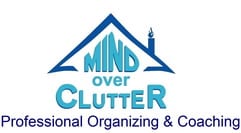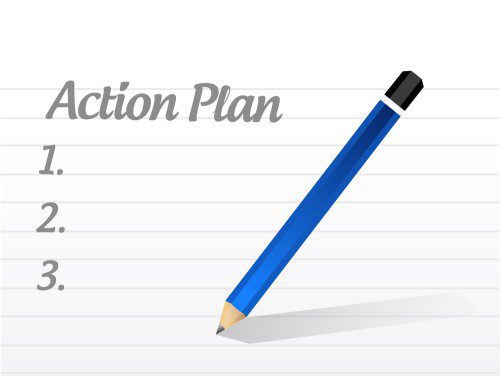5 reasons to use checklists for organizing your mind and space
Reading time – 5 minutes
I believe that having routines helps you to accomplish things using less energy. It automates chores and tasks that need to be done regularly to keep an office or home organized. If only one person knows the routines for all the tasks that person will get burnt out doing all the work. Delegating the work is the key. How do you delegate work that is in someone’s mind?
Checklists
Checklists can be used for many reasons.
- to make a process repeatable
- to clarify a task for another person
- to schedule tasks to be completed at regular intervals
- to reduce what you need to remember
Reproducible
I have many tasks that I do infrequently or that I am learning. I set up a checklist with all the steps I need to do so I don’t forget one. The checklist takes the stress out of completing the task. I don’t need to figure out how to do it each time. The checklist will be refined after each use when I realize I left out a step or I have found an easier way to do it.
Some examples are:
Collecting income tax records:
- material needs to be gathered from several institutions,
- forms need to be filed,
- receipts need to be organized,
- copies made
- information needs to upload to a portal
Setting up meetings:
- agendas prepared
- reports requested to be compiled/ submitted ahead of time for the meeting
- meeting notice was sent with the current date, time, location and attachments
- set-up meeting room in-person or virtual
- take meeting minutes
- meeting minutes sent out to attendees
- follow up on items to be completed by participants
Social media posting
- make a list of hyperlinks to social media sites so I don’t need to look them up each time
- record steps on how to post to each site until it becomes easy
- record the date when something was posted
- record the topic that was posted so it is not posted twice
If you need help with this task book a virtual session with me and we can set up your social media posting checklist.
Clarity
How many times have you asked someone to do something and you come back and you are shocked by what they did or didn’t do? Checklists clarify what needs to be done in order to call the task completed. It allows you to delegate work.
Some examples are:
Clean your room – this means something different to each person
- Take the sheets and pillowcases off the bed and put them in the laundry
- Put on clean sheets and pillowcases
- Pick up everything off the floor and put it away
- Dust everything( list the items)
- Vacuum the floor, closet and under the bed
- Empty the garbage can into ……
Filing
- place documents in designated box for filing
- recycle advertising
- shred unimportant documents with personal information on them
- sort the pile alphabetically or by date or category
- file placing new documents in the front, header to the left
Planning an event for your family or at work
- set date, time and place
- send out notice/invitation with date, time, directions, need to know information, RSVP
- start to build a purchasing list
- decide on food and drink- quantities, order or prepare on site
- set up the room – seating, decorations, pens, paper
- clean the location
- have a place for coats
- plan activity- ice breakers, games,
- purchase/shop for items for the event
- set up a timetable for the event
- reminder notice
- post signs showing where to go, the name of the event Developing a checklist is a good way to think through all the steps in a task. Share on X
Avoid mistakes, frustration and embarrassment
Checklists are great for things you do from memory to confirm you have not missed anything. Memory is fallible, especially the busier you get. If you have a checklist you won’t forget to make sure you have enough handouts for your meeting, you have defrosted the meat for supper, you have your passport etc. Sometimes I have a mental checklist I run through before leaving the house, a written checklist is better
How to write a good checklist
In his book, Gawande said a good checklist contains only five to nine items and fits on one page. You might not get your checklist right the first time, so practice using it in the real world, and then refine it as needed.
Checklists can improve performance, help you be more consistent, reduce anxiety and errors. If something you are doing and is hard, complicated, never seems to go right or needs to be delegated try making a checklist for that task. It is a good way to think through all the steps in a task. It only works if you use it before you begin your task.
Need help making a checklist book a 30-minute complimentary virtual organizing appointment. https://mindoverclutter.as.me/virtualorganizingassessment
 Julie Stobbe is a Trained Professional Organizer and Lifestyle Organizing Coach who brings happiness to homes and organization to offices, coaching you virtually using Zoom. She has been working with clients since 2006 to provide customized organizing solutions to suit their individual needs and situations. She uses her love of teaching to reduce clutter, in your home, office, mind and time. If you’re in a difficult transition Julie can coach you to break-free of emotional clutter constraining you from living life on your terms. Online courses are available to help instruct, coach and support your organizing projects. Get started by downloading Tips for Reorganizing 9 Rooms.
Julie Stobbe is a Trained Professional Organizer and Lifestyle Organizing Coach who brings happiness to homes and organization to offices, coaching you virtually using Zoom. She has been working with clients since 2006 to provide customized organizing solutions to suit their individual needs and situations. She uses her love of teaching to reduce clutter, in your home, office, mind and time. If you’re in a difficult transition Julie can coach you to break-free of emotional clutter constraining you from living life on your terms. Online courses are available to help instruct, coach and support your organizing projects. Get started by downloading Tips for Reorganizing 9 Rooms.
Contact her at julie@mindoverclutter.ca
X – Facebook – Facebook group Organizing Mind and Space




In the last few years, I’ve started documenting the steps every time I do something new. It makes it so much easier the next time or if I want to delegate a task.
I do the same thing, it feels so good to not have to figure out how to do something again and be able to pull up the checklist and “fly” through the task. This is especially true for tasks I don’t enjoy doing. The “pain” is over very quickly.
Excellent article Julie and Janet.
I make lists most days. It helps me to keep on track, though I do not always get them completed. So I carry them over to the next day.
I must admit I am not a Facebook fan, but it may something I need to readdress and take time to learn.
In the last few weeks/ months I have learnt how to scan to a PDF. so I do feel good about that, and yes I did write down the steps.
Thank for your help.
Christine
Writing down the steps to scan to PDF is a great example of a checklist. All the steps pertain to one task and get one thing done. It helps you do it correctly again and more quickly each time. Writing down a number of different tasks is a To-Do List. They are great for reminding you of what needs to be completed. Both are very useful. Good luck on your next skill, Facebook. I know you can accomplish it.
Great tips! Thanks for sharing. Checklists are wonderful for small business owners as well. I used to make detailed checklists, so it was easy for my project manager to delegate the job to someone else. It worked great and was easily transferable to another person.
When I was learning FaceBook ads they were invaluable.
I like the distinction you make between checklists and to-do lists. The checklists are for systems, a repeating process, or a project. They relate to a single topic. To-do lists tend to have random items on them that don’t necessarily relate to each other. In essence, though, a checklist is a type of to-do list, but more specific because all of the items or steps on a checklist are a task to handle.
I also noticed that many people think of them as the same thing. Whatever people call them they are important to have to make life easier and simpler. I find checklists make things easy for me because I don’t have to remember as much when I am under pressure to not forget anything.
This is making me think of my packing lists. I have a basic list that I tweak for each kind of vacation, e.g. skiing, the beach, weekend away, etc. It helps to have really focused on it once, and then once it is saved, I feel more confident packing. Of course, not going anywhere right now, but I’m staying positive that it will happen!!
I also have packing lists and I love them. I have a checklist for when I leave the house for a trip too: take the garbage out, turn the heat Up/down, turn off the water, back up my electronics, run/empty the dishwasher etc. I can share the list with the family and it all gets down quite quickly.
When I worked in television (my career before organizing), I documented everything I did and created checklists for every procedure so that I always had whatever I needed ready to do. You’re right, it made it so much easier to delegate tasks to to keep myself from skipping something accidentally. I teach my clients to use checklists for the same reasons, too.
And yet, other than for checklists related to travel (remember travel?!), where I cover everything from modifying my “contact” page, autoresponder, and outgoing voicemail message to packing and arranging for ground transportation, I hardly every create procedural checklists, trusting my gut and my memory. Perhaps I’d feel more confident about delegating (something I almost never do) if I felt confident about documenting all my procedures via checklists. Thank you for the important guidelines!
Thanks for your comment. It really shows the purpose of checklists. I use checklists for procedures too. It cuts down on the time it takes me to get the task done right once.
I LOVE checklists! Even if you think you know a procedure front and back, they can help ensure you don’t miss anything, and yes, help delegate tasks in a way that clearly communicates what you need to be done.
You are absolutely right. Thanks for commenting
Timely post, Julie, checklists have been on my mind lately. Creating a morning routine, an evening routine and a weekend routine has been a challenge – I’m tempted to detail every single step I take, which makes the checklists daunting. I’ll start following the suggestion you offered of limiting the checklist to 5 – 9 items. That should make things easier!
I sometimes start with a checklist and modify it as I go. When the procedure doesn’t work right I know I left out an important step and then I added it in. I don’t always get the checklist right the first time.
A very powerful tool with so many potential applications and so easy to vary the detail. Thanks for the information and tips 🙂
You’re welcome. Checklists can be adapted for many uses and be electronic or paper. Something for everyone.